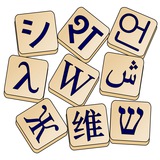✳ improve (verb)
Sounds:
- /ɪmˈpɹuːv/
Forms:
- improves (present, singular, third-person)
- improving (participle, present)
- improved (participle, past)
- improved (past)
improve (verb) senses:
1. (transitive) To make (something) better; to increase the value or productivity (of something).
2. (intransitive) To become better.
3. (obsolete) To disprove or make void; to refute.
...
Sounds:
- /ɪmˈpɹuːv/
Forms:
- improves (present, singular, third-person)
- improving (participle, present)
- improved (participle, past)
- improved (past)
improve (verb) senses:
1. (transitive) To make (something) better; to increase the value or productivity (of something).
2. (intransitive) To become better.
3. (obsolete) To disprove or make void; to refute.
...
💡 Example 💡 synestia
synestia (noun): For a brief time during its infancy, Earth was a hot, doughnut-shaped blob called a synestia. […] A synestia has an exterior region marked by clouds of molten rock and dust, all at a scorching 2000°C or hotter.
Ask @wikt_en_bot for 'synestia'
synestia (noun): For a brief time during its infancy, Earth was a hot, doughnut-shaped blob called a synestia. […] A synestia has an exterior region marked by clouds of molten rock and dust, all at a scorching 2000°C or hotter.
Ask @wikt_en_bot for 'synestia'
🗣 Conversation 🗣
Remy played darts for an hour at the tavern on his way home from work that night.
- (Remy) I stopped at the bar to spend an hour shooting dart before heading home.
- Good, are you still playing in the big tournament next weekend?
- Yeah I am, I'm pretty exited.
- How do you think you'll do?
- I feel really good, like I could even win!
- That's great, good luck!
Remy played darts for an hour at the tavern on his way home from work that night.
- (Remy) I stopped at the bar to spend an hour shooting dart before heading home.
- Good, are you still playing in the big tournament next weekend?
- Yeah I am, I'm pretty exited.
- How do you think you'll do?
- I feel really good, like I could even win!
- That's great, good luck!
🌜 Past Perfect 🌛
She had explored the ancient ruins of a castle before the site was closed.
She had explored the ancient ruins of a castle before the site was closed.
✳ absence (noun)
Sounds:
- /ˈæb.s(ə)n̩s/ (UK)
- /ˈæb.s(ə)n̩ts/ (UK)
- /ˈæb.sn̩ts/
- /ˈæbsɒns/
- /æbˈsɒns/
Forms:
- absences (plural)
absence (noun) senses:
1. A state of being away or withdrawn from a place or from companionship
2. The period of someone being away.
3. Failure to be present where one is expected, wanted, or needed; nonattendance; deficiency.
...
Sounds:
- /ˈæb.s(ə)n̩s/ (UK)
- /ˈæb.s(ə)n̩ts/ (UK)
- /ˈæb.sn̩ts/
- /ˈæbsɒns/
- /æbˈsɒns/
Forms:
- absences (plural)
absence (noun) senses:
1. A state of being away or withdrawn from a place or from companionship
2. The period of someone being away.
3. Failure to be present where one is expected, wanted, or needed; nonattendance; deficiency.
...
🗣 Conversation 🗣
Robin was Jesse's son and looked out for them as they were aging. Robin conducted Jesse's affairs.
- (Robin) I didn't realize my dad Jesse was so old until now.
- Does he need a lot of help?
- Yeah, I've been looking after his affairs.
- That's a good thing to do, he can be taken advantage of.
- I know, so I have to be very careful.
- You're a good son.
Robin was Jesse's son and looked out for them as they were aging. Robin conducted Jesse's affairs.
- (Robin) I didn't realize my dad Jesse was so old until now.
- Does he need a lot of help?
- Yeah, I've been looking after his affairs.
- That's a good thing to do, he can be taken advantage of.
- I know, so I have to be very careful.
- You're a good son.
💡 Example 💡 outshop
outshop (verb): Speaking of the mall, I'm here to tell you that no one on the planet can outshop Mrs. Jane Presley.
Ask @wikt_en_bot for 'outshop'
outshop (verb): Speaking of the mall, I'm here to tell you that no one on the planet can outshop Mrs. Jane Presley.
Ask @wikt_en_bot for 'outshop'
✳ tire (verb)
Sounds:
- /ˈtaɪ̯ə(ɹ)/ (UK)
- /ˈtaɪ̯ɚ/ (General-American)
- [ˈtʰaɪ̯ɚ] (General-American)
- /ˈtɑːɚ/ (Appalachia, Southern-American-English)
- /ˈtʌɪ̯ɚ/ (Canada, Midwestern-US)
Forms:
- tires (present, singular, third-person)
- tiring (participle, present)
- tired (participle, past)
- tired (past)
tire (verb) senses:
1. (intransitive) To become sleepy or weary.
2. (transitive) To make sleepy or weary.
3. (intransitive) To become bored or impatient (with).
...
Sounds:
- /ˈtaɪ̯ə(ɹ)/ (UK)
- /ˈtaɪ̯ɚ/ (General-American)
- [ˈtʰaɪ̯ɚ] (General-American)
- /ˈtɑːɚ/ (Appalachia, Southern-American-English)
- /ˈtʌɪ̯ɚ/ (Canada, Midwestern-US)
Forms:
- tires (present, singular, third-person)
- tiring (participle, present)
- tired (participle, past)
- tired (past)
tire (verb) senses:
1. (intransitive) To become sleepy or weary.
2. (transitive) To make sleepy or weary.
3. (intransitive) To become bored or impatient (with).
...
✳ tire (noun)
Forms:
- tires (plural)
tire (noun) senses:
1. (American spelling, Canadian spelling) alternative spelling of tyre: The rubber covering on a wheel.
2. (American spelling) alternative spelling of tyre: The metal rim of a wheel, especially that of a railroad locomotive.
3. A child's apron covering the upper part of the body, and tied with tape or cord; a pinafore. Also tier.
...
Forms:
- tires (plural)
tire (noun) senses:
1. (American spelling, Canadian spelling) alternative spelling of tyre: The rubber covering on a wheel.
2. (American spelling) alternative spelling of tyre: The metal rim of a wheel, especially that of a railroad locomotive.
3. A child's apron covering the upper part of the body, and tied with tape or cord; a pinafore. Also tier.
...
